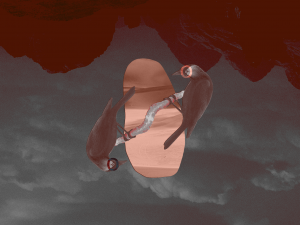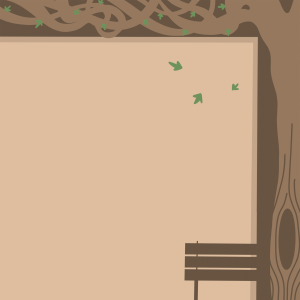How I learnt to stop worrying and love the hospital
by Tara Jovic | November 10, 2024

It wasn’t until I nearly bled out on the couch on a random Thursday night that I’d realised the severity of what had been happening to me over the past three months. On the television, a film about Sir Nicholas Winton (that adorable old man from the viral video who saved a bunch of Jewish children from Czechoslovakia during World War II) caught my attention; on my phone, a one-hour “Gordon Ramsay Best Insults” compilation (shoutout to the intern who revived that YouTube channel) drowned out other silence. The combined distractions did a wonderful job of blocking out most thoughts—except for: “Wait, why is there a red puddle forming underneath me?”
After wandering around the bathroom for a bit to assess the situation, I called emergency services and spoke to a weirdly optimistic dispatcher whose advice was to “wait a bit and see what happens.” Honestly, I didn’t mind. Maybe it was blood loss, but lying down and doing nothing seemed like a lovely option at that point. However, with Sir Nicholas and Chef Ramsay now out of earshot, my mind drifted off to July, when a routine medical exam had led to an unexpected phone call.
“We need to run some more tests,” the nurse said. I’d seen enough medical dramas to know what that meant. While my family and friends were full of reassurance—convinced that everything was fine but fearing otherwise—I felt the opposite: an acute awareness that something was wrong, but without any of the panic. That might be why I was secretly relieved to learn that, in true Mediterranean fashion, the lab team decided to take a collective vacation—I had a whole month to wait before getting my biopsy results.
There’s a certain comfort in the powerlessness of waiting. It’s probably why I’ve always enjoyed queuing—you take your place and know that at some point your turn will come. Time is for a brief period emptied of its determinative qualities and reduced to zone of transit, in which I loved to reside. Unlike the protagonists of Greek tragedies, I wasn’t aware of my specific fate, but just like theirs, it was predetermined and out of my hands. And I was totally fine with it.
That comfortable limbo was perhaps why, about an hour after the emergency call, I was still sitting on the bathroom floor, bleeding and waiting to decide what to do. But once I caught a glimpse of my pale, zombie-eyed reflection, it was the first time in months that I’d felt a sense of urgency. I finally called my Mum and boyfriend. By the time they came, I’d lost enough blood to have ruined my ability to speak. As they somehow managed to get me into my Mum’s car, I distinctly remember telling myself: “Do NOT bleed on the Mini Cooper seats,” struggling to stay awake.
The hum of the car’s engine and the weight of my eyelids reminded me of another late-night drive, about a month earlier, when a friend picked me up from Sarajevo airport. It was just days after my biopsy, and the doctor had warned me against flying. In my defence, I genuinely did try my best to spend that time in bedrest, but a girl can only watch so much Olympic archery in one day. A great work opportunity, dear friends, and the promise of escape awaited me in Sarajevo.
The three weeks I spent there allowed me to distance myself even further from the reality of the situation. I wasn’t supposed to exert myself, but I worked 16-hour days anyway. I was told to avoid physical activity, yet I spent my third day there chasing a friend’s escaped dogs up and down the neighbourhood hills. (It was, however, my fault they escaped, so I’d say that one was justified.) In short, I was irresponsible. And with all the fun I was having, reading the words “abnormal but inconclusive” in the biopsy report, emailed to me while drunk in some bar with strangers, felt more like an assignment extension than a wake-up call.
What woke me up was the nurses slapping me back into consciousness after our Mini Cooper trio arrived at the hospital. In retrospect, it’s safe to call the following events the lowest point of my life. There I was, an adult woman, sobbing like a baby; the rational part of me, shocked at the whining, was trapped too deep underneath the pain to intervene. The nurses were nice old women. I don’t remember my grandmothers, but they were what I imagine a grandmother would be. The doctor, a no-nonsense middle-aged woman, had the air of a stern but caring mum.
Lying on their table, waiting to be stitched up, I felt like a baby wanting to be held. But instead of being cradled and rocked back to sleep, they just patched me up and transferred me to a bed. I was given a transfusion, then painkillers. With the pain slowly fading, I tried to find the ending of that Nicholas Winton movie on YouTube, but to no avail. Regardless, as I hugged my pillow, enjoying the safety of my newfound all-women family of medical professionals, I thought: “I love this emergency room, and I never want to leave.” It was the same feeling I had right after the surgery the abnormal biopsy results had warranted.
Earlier that week, in a different hospital bed, I was having the time of my life. Both my parents, a rare sight post-divorce, came to pick me up after the operation. I got a giant plush dog, and there was a great Thai place down the street—Chef Ramsay would have liked it. To be honest, it felt as if I’d cheated the system somehow, being treated like a princess because everyone thought I’d gone through something terrible, when, in fact, I was just high on medical-grade drugs for a few days. (The only genuinely terrible thing was removing the half meter of gauze they’d stuck inside me.) And it wasn’t just me—the doctors seemed nonchalant and optimistic, happy with the surgery outcome, just asking me to drop in for a routine checkup on Thursday.
Well, Thursday was the day of our couch-bleeding incident. That morning, the doctors showed me the results of my post-op biopsy, which came to reveal the “abnormal but inconclusive” cells had in fact progressed to cancerous ones. But thing is—they were gone now. It’s strange to learn the extent of your illness after the fact. I didn’t feel relief, but rather guilt, like an imposter for being so blissfully unaware. In the hospital, I’d seen people who were actually sick. I read their stories and watched films about them. And I simply felt as if I hadn’t suffered enough to fit in with that group, of which I was now technically a part. That might be why, on purpose or not, I went home after the check-up, took a long hot bath despite my doctor’s instructions, and almost bled out as a consequence.
In hindsight, everything seems obvious—like an overly directed film, with each moment clearly leading to the next, culminating in some kind of symbolic catharsis. But while it’s happening, you’re clueless to both the meaning of the events and the motivating factors behind your own actions. Maybe that’s why I decided to write about it. By fitting a senseless situation into a sensible narrative a posteriori, perhaps I hoped I might be free of some of it?
It’s like retelling a memory: the first time, it’s a bit clumsy, but you somehow get the point across. After a dozen retellings, you get the rhythm down. The speech and pacing are perfect—it’s not embellishment, just practice that helped you reach and articulate the truth. After catching up with dozens of friends whose messages I’d ignored for months, feeling obliged to give them a bite-sized version of the reasons behind my absence, I feel like my story’s taken quite a nice shape.
Although my self-induced near-death experience liberated me from the aforementioned guilt, I don’t think I’ve made full sense of the situation as a whole. I’m still waiting to feel shaken or afraid, or at least something beyond this underwhelming sense of, “Is that really all there is to it?”. However, the newfound ‘wisdom’, to which this situation (unfortunately for everyone) entitles me, could be boiled down to two lessons.
Lesson one: the medical dramas get it wrong. Hearing your diagnosis, the word “cancer”, or the details of the many invasive procedures awaiting you isn’t all that striking. These abstractions only gain their meaning once rendered concrete by the moments they entail: the feeling of one too many IVs being pushed into your hand or trying to squeeze into your infant sister’s diapers after bleeding through all of your pads in a matter of minutes.
Despite how surreal or uncomfortable all those scenes might have felt, living through and laughing at them reaffirmed my belief in the astounding ability humans have to adapt to new and often terrible realities. And while I feel lucky to be able to live at least a couple more moments—uncomfortable or otherwise—the second lesson, and the one I’ll leave you with, is that if I truly had to go, I now know dying to Sir Winton or Gordon Ramsay’s Kitchen Nightmares would have been completely fine by me. ∎
Words by Tara Jovic. Image Courtesy of Tara Jovic.
![Coleridge Called from Venus [Last Night's Dream] 10876541795_73de41f92c_o](https://isismagazine.org.uk/wp-content/uploads/2015/03/10876541795_73de41f92c_o-300x200.jpg)



